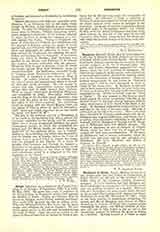

Benignus of Dijon, Saint, Martyr, honored as the patron saint and first herald of Christianity of Dijon (Divio), an old city in the territory of the Gallic tribe of the Lingones (civitas Lingonum, Langres). It is an historical fact that Benignus suffered martyrdom in a persecution of the third century and was publicly honored as a martyr. His feast falls on November 1; his name stands under this date in the so-called Martyrology of St. Jerome (ed. Rossi-Duchesne; cf. Acta SS., November, II, 138). Early in the sixth century no particulars concerning the person and life of Benignus were known at Dijon. According to Gregory of Tours the common people reverenced his grave; but Bishop Gregory of Langres (507-539 or 540) wished to put an end to this veneration, because he believed the grave to belong to a heathen. Having learned in a vision at night that the burial spot was that of the holy martyr Benignus, he had the tomb in which the sarcophagus lay restored, and he built a basilica over it. About this date there was a sudden appearance of Acts of the martyrdom of the saint, which were brought to Dijon by a pilgrim on the way to Italy (Gregor. Tur., De gloria, martyrum, I, li; Migne, P.L., LXXI, 752). These accounts have no historical basis; according to them St. Polycarp of Smyrna had sent Benignus as a missionary to Dijon, where he had labored as a priest and had finally died a martyr. For some unknown reason his death is placed in the persecution under Aurelian (270-275). The author had not noticed that the sending by Polycarp and the martrydom under Aurelian are chronologically irreconcilable. Duchesne has proved that these “Acts” belong to a whole group of legends which arose in the early years of the sixth century and were intended to describe the beginnings of Christianity in the cities of that region (Besancon, Autun, Langres, Valence). They are all falsifications by the same hand and possess no historical value.
J. P. Mason.

